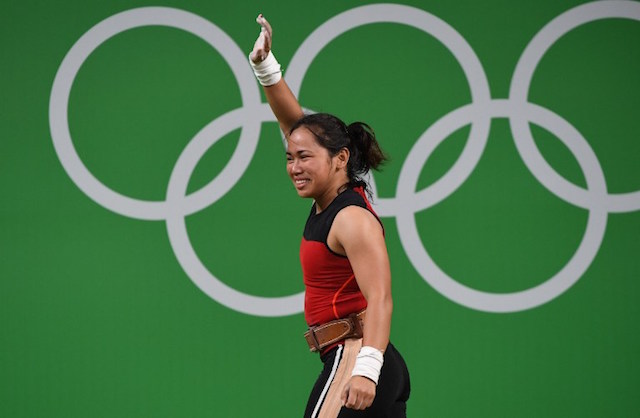
Philippines’ Hidilyn Diaz celebrates during the women’s 53kg weightlifting event at the Rio 2016 Olympic games in Rio de Janeiro on August 7, 2016. AFP
RIO DE JANEIRO—A Summer Olympics that will be remembered for its carnival celebration of the triumph of the human spirit as much as the good, the bad and the ugly among its athletes came to a spectacular close Sunday night (Monday morning in Manila) at the iconic Maracaña Stadium.
It didn’t matter if it rained as Rio de Janeiro lighted up one last time.
The closing ceremony, on a lower budget than the opening yet happier and more striking, again toasted the best of Brazil’s music, dances and culture in electronically enhanced performances masterminded by the nation’s greatest musicians and carnival designers.
As fireworks lit the sky, about 3,000 out of the original 11,427 athletes who vied for honors in 28 sports over 16 frenetic days here hop-danced their way onto a packed stadium that thundered with expressions of joy, thanks and farewell.
Friendship and universal unity in sports erased country distinctions as athletes from Angola mingled with their counterparts from Australia and Azerbaijan.
The opening ceremony’s backdrop of worry and warning simply evaporated in the spirit of Olympism and fiesta fun over a fortnight of serious but friendly competition.
Taekwondo fighter Kirstie Elaine Alora, the only remnant of what had been a 13-athlete Philippine team in this Olympics, marched with delegation officials led by chief of mission Joey Romasanta.
It was mission accomplished for the International Olympic Committee (IOC), which had doubted the capacity of the Rio organizers to stage the event in the face of the Zika virus threat, as well as the country’s economic problems and political unrest.
And it was mission accomplished as well for the Philippines, which finally ended its 20-year Olympic dry spell and toasted the silver medal performance of its new heroine, weightlifter Hidilyn Diaz.
The United States matched its tally of 46 golds from London four years ago to lead the medals table from Britain, which sealed surprise second place ahead of China with 27 golds to 26.
While it was hard to ignore the Brazilians’ incredible zest for sports, the spotlight sometimes turned from the amazing feats of such heroes as Usain Bolt, Michael Phelps and Mo Farrah to the ugly deeds of Rio bad eggs like Ryan Lochte and his band of drunk American swimmers who vandalized a gas station.
Lochte was not there to be pilloried, and so was Brazil’s acting President Michel Temer who was booed at the opening ceremony.
Despite tweeting he might attend, Brazil’s most-loved athlete Pele again missed the celebration due to poor health. The football great had also been expected to light the Games torch during the opening.
Sunday’s rite was arguably more vibrant and on a smaller budget than London 2012—about 10 percent of Great Britain’s outlay, according to some estimates here—and it ended with IOC president Thomas Bach thanking Brazil and the Olympic flag handed over to Yuriko Koike, governor of Tokyo, host of the 2020 Games.
Koike is the first woman to lead the Japanese capital.
Only then was the sacred Olympic flame extinguished, bringing the curtain down on Brazil’s biggest carnival, orchestrated by the eminent Rosa Magalhaes with the electronic brilliance of tropical musician Kygo, and participated in by Brazil’s constellation of samba artists.

